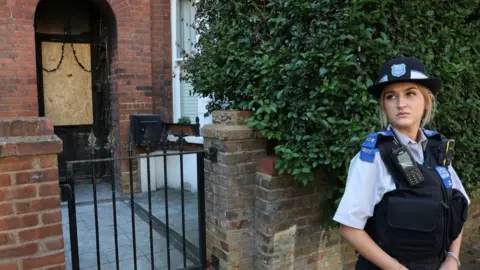A recent spate of arson incidents linked to Prime Minister Sir Keir Starmer has led to the arrest of a fourth individual, as confirmed by the Metropolitan Police. The police made the arrest of the 48-year-old suspect at London’s Stansted Airport following a stop under schedule 7 of the Terrorism Act of 2000. The individual is suspected of conspiracy to commit arson with intent to endanger life, raising serious concerns about public safety surrounding events associated with high-profile political figures.
This arrest is significant as it follows several suspicious fires connected to Prime Minister Starmer, including a vehicle fire in Kentish Town, located in north London, as well as a fire at the Prime Minister’s residential address on the same street. Additionally, there was a fire at a property in Islington where he previously resided. The nature of these incidents not only raises alarm regarding Prime Minister Starmer’s safety but also points to broader issues concerning public reactions and threats toward politicians in the current climate.
The new suspect, who remains unnamed and is currently in police custody at a London police station, is part of a larger investigation that has already seen the arrest and charging of three other men. These individuals include Ukrainians Petro Pochynok, 34, Roman Lavrynovych, 21, and Stanislav Carpiuc, 26, a Romanian national born in Ukraine. The three suspects are slated to appear at the Old Bailey, the Central Criminal Court of England and Wales, on Friday where they will face charges related to these arson incidents.
Roman Lavrynovych has been charged with three counts of arson with intent to endanger life, highlighting the severity of the accusations. Meanwhile, both Stanislav Carpiuc and Petro Pochynok have been charged with conspiracy to commit arson with the same intent. These ongoing legal proceedings further indicate the serious judicial approach being taken in response to these alarming incidents.
The timeline of the events surrounding these arson activities is particularly concerning. On May 8, four days prior to the fire at Prime Minister Starmer’s residence, a vehicle was set ablaze in the vicinity, signaling a pattern of targeted attacks in the area. The fire at Starmer’s home occurred early on May 12, shortly after President Starmer had transitioned to the responsibilities associated with his role at Downing Street. Additionally, another fire incident took place on May 11 at a front door of a house converted into flats in Islington, which adds to the growing list of fire-related offenses under scrutiny.
The involvement of multiple suspects, including individuals from different nationalities, raises questions about the motives behind these dangerous acts. With a fourth man now arrested, the Metropolitan Police are likely to intensify their investigation into not only these incidents but also any potential connections that might exist between them and the broader political sphere. The law enforcement response highlights how serious these threats are perceived to be, particularly in light of the contemporary political landscape which has already seen heightened tensions.
Furthermore, the public is left to contemplate the implications of such targeted violence against political figures, which can have ripple effects throughout society. The safety of politicians and public figures is paramount and the involvement of arson implies that individuals or groups may feel emboldened to resort to dangerous means to express their dissent. Society at large will be watching the unfolding legal proceedings closely, questioning how effectively authorities can protect public figures and prevent similar incidents in the future, while ensuring justice is served for those directly impacted by these attacks.



